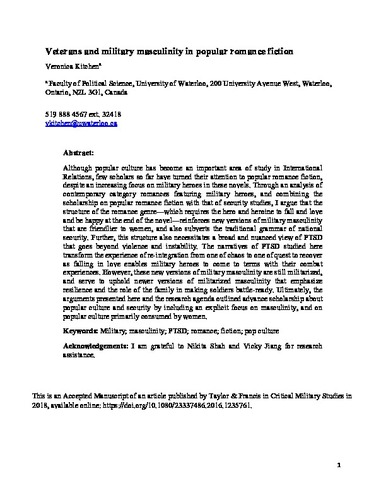| dc.contributor.author | Kitchen, Veronica | |
| dc.date.accessioned | 2019-01-04 16:59:01 (GMT) | |
| dc.date.available | 2019-01-04 16:59:01 (GMT) | |
| dc.date.issued | 2018 | |
| dc.identifier.uri | https://doi.org/10.1080/23337486.2016.1235761 | |
| dc.identifier.uri | http://hdl.handle.net/10012/14305 | |
| dc.description | This is an Accepted Manuscript of an article published by Taylor & Francis in Critical Military Studies in 2018, available online: https://doi.org/10.1080/23337486.2016.1235761. | en |
| dc.description.abstract | Although popular culture has become an important area of study in international relations, few scholars so far have turned their attention to popular romance fiction, despite its popularity among readers. Through an analysis of contemporary category romances featuring military heroes, and combining the scholarship on popular romance fiction with that of security studies, I open a new area of study for scholars of security. I argue that the structure of the romance genre – which requires the hero and heroine to fall and love and be happy at the end of the novel – reinforces particular kinds of politics. First, the focus on intimate relationships closes off broader critiques of global politics. Second, the focus on the home front reinforces the idea that there is no possible distinction between a peaceful home front to be protected and an international space of war. Third, heroes dealing with grief, post-traumatic stress disorder (PTSD), and other problems of a return to civilian life after deployment are portrayed as turning chaos into quest, again through a courtship narrative. Because of the familiar settings and stories that ‘feel true’, popular romance fiction is a site for the reproduction of specific kinds of military masculinity and military families. While these fictional accounts can have the beneficial effect of providing more nuanced portrayals of possible intimate lives of soldiers, they also close off critiques of politics and help to order a resilient, war-ready society and reinforce these images among readers who may not otherwise seek out non-fictional stories about the military. | en |
| dc.language.iso | en | en |
| dc.publisher | Taylor & Francis | en |
| dc.subject | military | en |
| dc.subject | masculinity | en |
| dc.subject | PTSD | en |
| dc.subject | romance | en |
| dc.subject | fiction | en |
| dc.subject | pop culture | en |
| dc.title | Veterans and military masculinity in popular romance fiction | en |
| dc.type | Article | en |
| dcterms.bibliographicCitation | Veronica Kitchen (2018) Veterans and military masculinity in popular romance fiction, Critical Military Studies, 4:1, 34-51, DOI: 10.1080/23337486.2016.1235761 | en |
| uws.contributor.affiliation1 | Faculty of Arts | en |
| uws.contributor.affiliation2 | Political Science | en |
| uws.typeOfResource | Text | en |
| uws.peerReviewStatus | Reviewed | en |
| uws.scholarLevel | Faculty | en |

